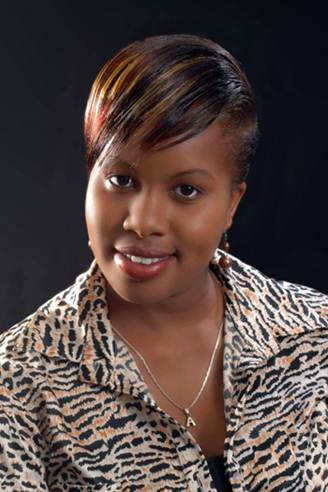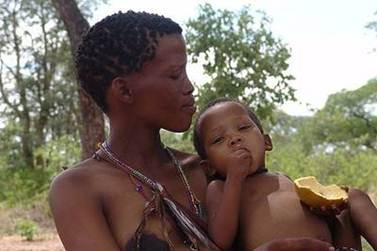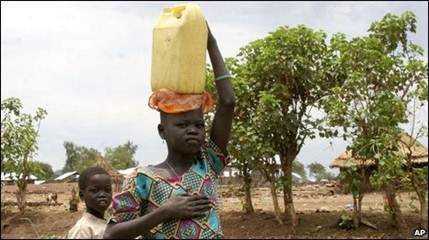
Meet the woman who turns plastic from dangerous waste into
products that are good for the environment and who has won a prestigious
international award for her efforts
As a young child in
Kenya, Lorna Rutto was disturbed by the plastic waste littering the streets of
her native Nairobi; as an adult she has found a solution to the problem that is
threatening to literally bury the city.
After leaving a career
in finance, Rutto ventured into entrepreneurship with business partner Charles
Kalama, a biochemical engineer. She says: “I love my work and I e much better
being my own boss. Each day when I go to work, I feel I am serving my purpose
on this Earth.” Her purpose has seen the monthly removal of close to 20 tons of
plastic waste from landfills around Nairobi to be processed and transformed
into fencing posts.
The waste problem in
Nairobi has reached dangerous levels. “It is so bad that UNEP (the United
Nations Environment Programme) has classified it as one of the worst humanitarian
crises in the city,” says Rutto. The fence posts produced by her company,
EcoPost, provide a sustainable solution to the growing problem. “They also
provide an alternative to timber and thus prevent the cutting down of trees.”
In a city plagued by
poverty Ruto’s project has not only served the environment: it is doing what it
can for job creation and female empowerment in a patriarchal society. “Our employees
provide better living standards, nutrition and education for their children. My
satisfaction every day is derived from the act that fewer children go to bed
hungry because their mothers earn a livelihood from out project. ”
On 14 October 2011,
Rutto attended the fifth Cartier Women’s Initiative Awards ceremony in
Deauville, France. She was one of 18 finalists from 13 different countries
selected from an applicant pool of over 1,000 projects across a variety of
fields, from engineering to adult education. After being coached by mentors
from Cartier, INSEAD Business School and McKinsey & Company management
consulting firm, the finalists submitted and presented business plans to the
jury who then chose the winners. The process, that spanned seven months,
resulted in the selection of six laureates one from each region around the
world. Rutto returned to Kenya as Cartier’s Women’s Initiative Laureate for
sub-Saharan Africa and truly enriched by her experience. “I was very touched to
meet 17 lovely ladies from all over the world living thoughtful lives and making
a difference in society.”
Part of her prize was
an invitation to attend the Annual Global Meeting of the Women’s Forum for the
Economy and Society in Deauville. “It was truly amazing! I was able to network
and meet with many inspiring women. Most of them have contributed greatly to
society and I felt so privileged.”
Each laureate also
received $20,000 (about R157 000) in seed money and a year of business
coaching. “I have started using the funds to help women set up collection yards
from which we will buy our raw material. We have also bought a truck, which has
already boosted our capacity.” This, Rutto hopes, will be the beginning of
EcoPost’s expansion across Kenya and the greater Eastern African region. “We
also intend making products for various other uses such as support beams and
roofing trusses for the construction industry as well as furniture all of which
are multimillion shilling industries in Kenya.”

Rutto has big plans
for EcoPost. Her vision is big, but her goals are simple and straightforward:
“To transform all of Africa’s waste into wealth by creating more than 250,000
jobs and since our products provide an alternative to timber-have no more
cutting down of trees.”
The international
acknowledgement of her project has motivated Rutto and reaffirmed her passion
to keep working for the good of the environment as well as for the empowerment
of the women in her community. I intend to improve our business and the living
standards og the many women we work with.
As for what makes a
successful businesswoman, Rutto says, “A successful woman does things
passionately and consistently and inspires people to develop new ideas to be
able to solve their own problems. She is someone who has empowered people to
achieve greatness.”
Cartier women’s initiative awards laureates

Latin America: Carolina Guerra, Columbia
Ingerecuperar – Engineering solutions to
recover hazardous waste
When aluminum is
smelted, a substance called dross is a byproduct of the process. While working
as a materials engineer Carolina Guerra came into contact with tis hazardous
material and began looking for ways to turn it into something useful. In 2007
she started her company, Ingerecuperar, that specializes in producing products
such as building blocks, benches and fence posts from the cement like
substance. Because of her work, Columbian landfills are kept free of the
dangerous waste material and the strain on the environment that this doss
previously caused is alleviated.
North America: Benita Singh and Summer Rayne Oakes, USA
Source4style- A global source for
sustainable materials
Singh and Oakes have honed in on the very
foundation of the international fashion industry and source materials from
ethical and sustainable suppliers to protect both the environment and the
artisans who create these materials. Strict sustainability criteria apply: a
material must be environmentally preferable, recycled or reclaimed, fair trade compliant
or craft preserving. High resolution images of the materials are then posted on
the Source4Style website (source4styl.com) so that designers can examine the
weave. Registered site users can then request swatches and subscribers place
production orders directly with the producer. Because there is no middleman,
Source4Style also offers better prices to its buyers and sellers.
EUROPE: Kresse Wesling, Unite Kingdom
Elvis
& Kresse Sustainable luxury goods made from waste
Kresse Wesling built a business on waste
and having an eye for beautiful things. Together with her business partner,
James Henrit (“Elvis”), Wesling in 2007 began creating their now
internationally recognized line of luxury accessories such as fashionable belts
made from unused fire hoses and shopping bags made from old coffee sacks. Their
pieces are sold in London’s Harrods department store and recently were taken up
by stores in New York too. The company donates 50 percent of all profits to
charities such as The Fire Fighters Charity and the WWF.
Middle East and North Africa: Rana El Chemaitelly, Lebanon

The little engineer Hands on engineering
skills for the young
After realizing that her son’s addiction to
video games was making him unsociable, Rana El Chemaitelly set up an after
school activity centre where children as young as four can learn about science,
technology, engineering and mathematics. The mechanical engineer drew on her
experience as a university instructor and developed a series of edutainment
activities to encourage critical thinking in young minds. The business is also
committed to equal opportunities and hosts sessions for children from
lower-income homes and public funded schools.
Asia Pacific” Chunhong Chen, China
Yiyuan
environmental group - Patented technology that saves up to 83 percent of toilet
water
Flushed water make up at least half of the
water consumed by Chinese households. Unlike conventional six-litre toilets,
Yiyuan’s toilets use only one litre to flush by taking water directly from the
main water supply, thus eliminating the need for storage tanks that tend to
leak. Chunhong Chen, a former teacher, has no engineering experience but
nevertheless went into business with her brother who invented the technology
Yiyuan now uses. Their breakthrough came when they were commissioned to equip a
number of pavilions with toilets for the Shanghai Expo in 2010.
How to enter the cartier women’s initiative 2012:
Women led creative for profit businesses
in the start-up phase are eligible for the award. A detailed application form
(requiring the equivalent of a short business plan) is available at
cartierwomensinitiative. Com and entries for the 2012 Awards close on 13
March 2012.